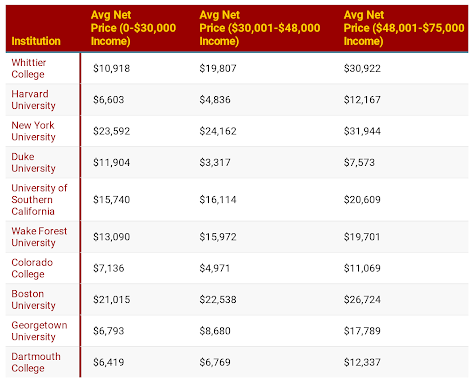With our expert admissions assistance, we will walk your child through each question of a college application and let them know what admissions committees are indirectly asking. We will help your child showcase their personal achievements in a way that optimizes their strengths and resonates with the selection committee.
Application Timeline
- Students applying for Early Action and Early Decision must submit their applications. The EA/ED deadline for most colleges is November 1.
- If needed, students must register for the December SAT or ACT by early November; for most colleges, these are the last test scores that will be considered.
- Students who submit the USC application by November 1st will be automatically considered for USC scholarships.
- Many top-tier universities and selective colleges will have Regular Decision application deadlines as early as December 1st. Students should be preparing to submit.
- Check the university website for the Early Action and Early Decision notification dates for the upcoming academic year. Students are usually notified mid-December.
- University of California and Cal State University applications are due by December 2.
- Although most students will have completed their college applications by January, they must maintain their grades throughout their senior year. Colleges can revoke the admission of any student, even after being accepted
- Acceptance letters and financial aid offers will start to arrive. Review acceptances, compare financial aid packages, and visit your child’s final choices, if possible.
- When your child has made their college decision, they must submit their statement of intent to register and make a deposit to the college they will attend by May 1. If the student has been offered financial aid, they must accept the offer and follow the instructions given. Students should also notify schools they will not attend.
- Your child should check their student portal on the college website regularly to submit any required documents to their college.
- Colleges host spring admit weekends on campus in April. Students have the opportunity to visit the schools they’ve been admitted to and make a more informed decision about which college to attend.
How to choose the right colleges for your student:

When considering which colleges and universities to apply to, we encourage our scholars to consider what is the best match and fit for them.
How do you know if a college is a match for your child?
Certain college qualities are universal. Every parent and student should have similar expectations about what defines a match college, such as:
- Strong graduation rate – in comparison to other options, across subgroups
- Affordability – both tuition and cost of living
- Admissibility– given grades and test scores, the student has a reasonable chance of getting in
- Special transition/success programs that facilitate completion for low-income, first-generation students
How do you know if a college is a good fit for your child?
Some college qualities are specific to each student’s preferences, such as:
- Size
- The majors offered
- Location
- The personality of the student body
When assessing a school, match is always priority #1
Students need to know a college is a match before it’s useful to consider whether it’s a fit. This greatly increases the likelihood that you are exploring affordable and supportive schools.
College Planning Tools for Parents & Students
Helping Your Scholar Plan for College
parents.collegeboard.org
This website is for parents, guardians, relatives, and other adults helping a student plan for college. Sign up for free to receive emails and texts with college info, advice, and reminders. En Español: padres.collegeboard.org
collegescorecard.ed.gov
The College Scorecard is an interactive college search tool created with direct input from students, families, and their advisers. The College Scorecard is primarily designed for students and families, so the data are presented in an easy-to-understand graphical format.
www.collegedata.com
Parents and students can sign up for free on CollegeData to explore colleges to find the right match and fit university for the student. CollegeData provides admissions, financial, academic, campus life, and student information on thousands of colleges nationwide.
Graduation Rates
www.collegeresults.org
College Results Online (CRO) is an interactive, user-friendly Web tool designed to provide parents, policymakers, counselors, students, and others with information about college graduation rates for nearly any four-year college or university in the country.
Affordability
bigfuture.collegeboard.org
Big Future offers a variety of financial aid tools and calculators. For example, the Net Price Calculator will estimate the costs for undergraduate tuition and expenses at an individual college, as well as their potential eligibility for need-based financial aid based on individual circumstances.
College graduation rates
The College Scorecard’s school comparison tool lets you compare colleges by graduation rate, cost, financial aid, acceptance rate and more.
Get to Know Each School
There are a number of sites and resources to help you and your student gather college information:
-
College Websites
Students and parents can gather specific information like application deadlines, application requirements, majors, core course requirements, and student organizations directly from each university’s website.
-
College Visit & Information Session
Students should attend as many college visits and information sessions as they can to learn first-hand what the college is all about. Students should remember to take notes to record important information. Parents are encouraged to be involved in the campus visit, but allow the student to take the lead and ask their own questions.
-
The College Board
www.collegeboard.com
The College Board provides various statistical data on colleges, primarily related to admissions. Students and parents should use this site to get an overview of the school. -
UNIGO
www.unigo.com
Every college has a different personality—political bent, strongest academic programs, teaching style, social life, etc. Parents can create a free Unigo account to gain access to college reviews and scholarships.
Average Net Price by Household Income
Net Price Calculators will allow you to estimate the true cost of your student’s college education based on your own family income.

Source: https://www.collegetransions.com/net-price-by-institution
College Transitions | Created with Datawrapper
College Admissions Tests
Most colleges will consider college admissions test scores when deciding whether or not to admit students. Higher test scores often correlate to earning merit-based scholarships and higher admission rates. However, admissions officers will give the most weight and importance to your student’s high school grades and whether they are challenging themselves academically.

USC Bovard Scholars Personalized Test Preparation
We offer the highest quality, personalized test preparation tailored to your child’s focus areas. Our scholars take numerous practice exams that simulate the real thing, helping your child build confidence and understand what to expect. At the completion of our program, our scholars will have reached their personal best score.
What Are College Admissions Tests?
You may know college admission tests by name — the SAT, SAT Subject Tests and the ACT. These tests are designed to help colleges evaluate how ready your child is for college-level work.
When Should Your Student Take the Test?
Most high school students take the ACT or SAT, or both during the spring of their junior year or fall of their senior year. It’s important to leave time to retake the test if they want to raise their score before they apply to college.
- To learn about SAT exam registration and test dates, visit the CollegeBoard.
- To learn about ACT exam registration and test dates, visit the ACT website.
Paying For the Test
The SAT and ACT both offer fee waivers to eligible students — meaning that your child will not have to pay anything for their exams. All Bovard Scholars students will be provided with an exam fee waiver during their summer residency at USC.


